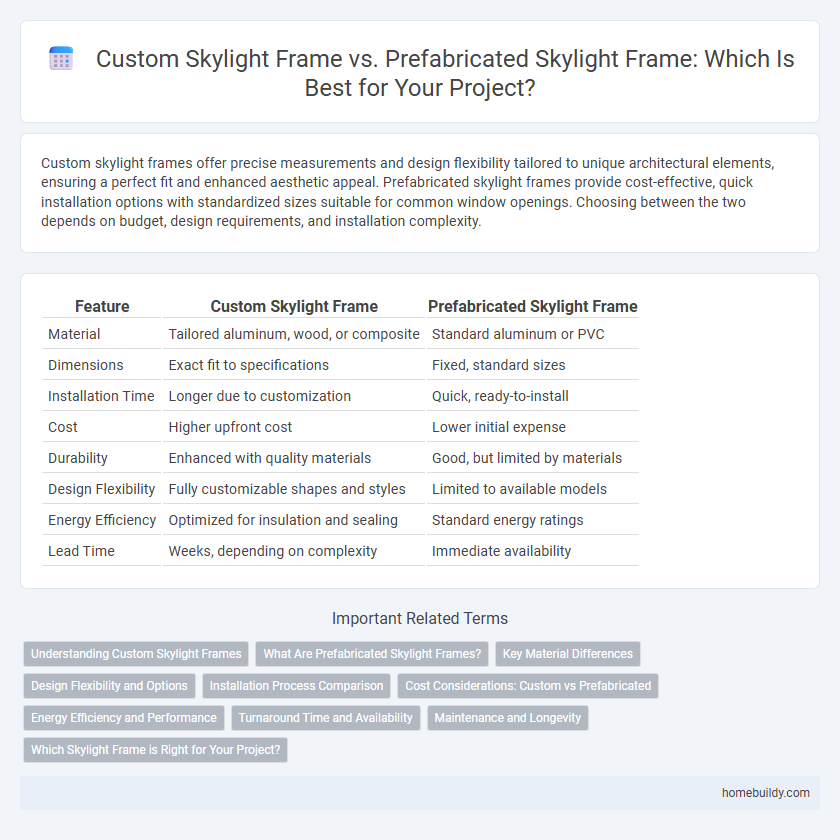Custom skylight frames offer precise measurements and design flexibility tailored to unique architectural elements, ensuring a perfect fit and enhanced aesthetic appeal. Prefabricated skylight frames provide cost-effective, quick installation options with standardized sizes suitable for common window openings. Choosing between the two depends on budget, design requirements, and installation complexity.
Table of Comparison
| Feature | Custom Skylight Frame | Prefabricated Skylight Frame |
|---|---|---|
| Material | Tailored aluminum, wood, or composite | Standard aluminum or PVC |
| Dimensions | Exact fit to specifications | Fixed, standard sizes |
| Installation Time | Longer due to customization | Quick, ready-to-install |
| Cost | Higher upfront cost | Lower initial expense |
| Durability | Enhanced with quality materials | Good, but limited by materials |
| Design Flexibility | Fully customizable shapes and styles | Limited to available models |
| Energy Efficiency | Optimized for insulation and sealing | Standard energy ratings |
| Lead Time | Weeks, depending on complexity | Immediate availability |
Understanding Custom Skylight Frames
Custom skylight frames offer tailored dimensions and materials to perfectly fit unique roof designs and architectural styles, ensuring optimal insulation and durability. Unlike prefabricated skylight frames, which come in standardized sizes and may require costly modifications, custom frames provide precise installation with enhanced energy efficiency and weather resistance. Choosing a custom skylight frame maximizes natural light penetration while maintaining the structural integrity of the building.
What Are Prefabricated Skylight Frames?
Prefabricated skylight frames are factory-made units designed for quick installation and consistent quality, often constructed from materials like aluminum, vinyl, or fiberglass. These frames come in standardized sizes and shapes, providing cost-effective solutions for common skylight applications but may lack customization for unique architectural needs. Their modular design ensures durability and weather resistance, making them a popular choice for residential and commercial projects with predictable specifications.
Key Material Differences
Custom skylight frames are typically constructed from high-grade materials like anodized aluminum or stainless steel, offering superior durability and corrosion resistance tailored to specific environmental conditions. Prefabricated skylight frames often use standard-grade aluminum or vinyl, which limits customization but allows for quicker installation and cost-effectiveness. Material thickness and finish quality in custom frames enhance thermal insulation and weatherproofing compared to the more uniform and less specialized materials in prefabricated options.
Design Flexibility and Options
Custom skylight frames offer superior design flexibility, allowing precise dimensions, unique shapes, and tailored materials that perfectly fit architectural requirements, unlike prefabricated skylight frames which come in standard sizes and limited styles. Custom options enable integration of advanced glazing technologies and finishes, enhancing both aesthetics and energy efficiency. Prefabricated frames provide quicker installation but lack the adaptability needed for complex or innovative skylight designs.
Installation Process Comparison
Custom skylight frames require precise measurements and tailored fabrication, resulting in a longer but highly accurate installation process that ensures a perfect fit and better energy efficiency. Prefabricated skylight frames offer quicker installation due to standardized dimensions and pre-assembled components, but may require additional adjustments to accommodate variations in roof design. Choosing between the two depends on balancing installation time with the need for a seamless fit and long-term performance.
Cost Considerations: Custom vs Prefabricated
Custom skylight frames typically incur higher initial costs due to tailored design, specialized materials, and labor-intensive installation processes, while prefabricated frames offer cost savings through mass production and standardized sizing. Budget-conscious projects often favor prefabricated skylight frames to minimize expenses without compromising quality, especially for common window dimensions. Long-term costs may vary based on durability and maintenance, with custom frames potentially offering better energy efficiency and aesthetic integration that offsets initial investments.
Energy Efficiency and Performance
Custom skylight frames offer superior energy efficiency and performance by allowing precise tailoring of insulation materials and frame dimensions to fit unique window openings, reducing thermal bridging and air leakage. Prefabricated skylight frames, while cost-effective and quicker to install, often have standardized designs that might not maximize energy savings or fit perfectly, potentially compromising overall thermal performance. Investing in custom frames enhances durability and long-term energy conservation by optimizing thermal breaks and high-performance glazing compatibility.
Turnaround Time and Availability
Custom skylight frames offer tailored dimensions and designs but typically require longer turnaround times due to manufacturing and fabrication processes. Prefabricated skylight frames are readily available in standard sizes, enabling faster installation and immediate project progression. Choosing between them depends on the urgency of availability and the need for precise fit and customization.
Maintenance and Longevity
Custom skylight frames offer superior durability due to tailored materials and craftsmanship, ensuring enhanced resistance to weathering and reduced maintenance over time. Prefabricated skylight frames, while more affordable, often require more frequent upkeep and may be prone to wear due to standardized components not optimized for specific environmental conditions. Investing in a custom skylight frame can significantly extend the lifespan and minimize maintenance costs compared to common prefabricated alternatives.
Which Skylight Frame is Right for Your Project?
Choosing between a custom skylight frame and a prefabricated skylight frame depends on project specifications and budget constraints. Custom skylight frames offer tailored dimensions, enhanced energy efficiency through precise insulation, and unique aesthetic integration for architectural compatibility. Prefabricated skylight frames provide cost-effectiveness, faster installation, and standardized quality, ideal for projects with common size requirements and limited timelines.
Custom skylight frame vs prefabricated skylight frame Infographic

 homebuildy.com
homebuildy.com